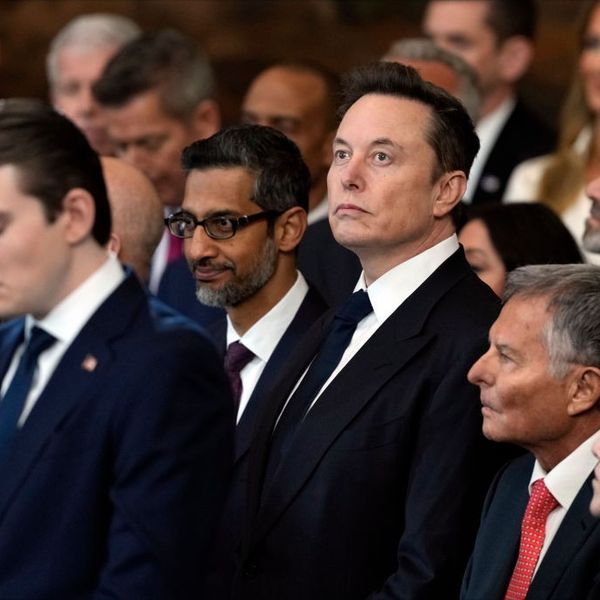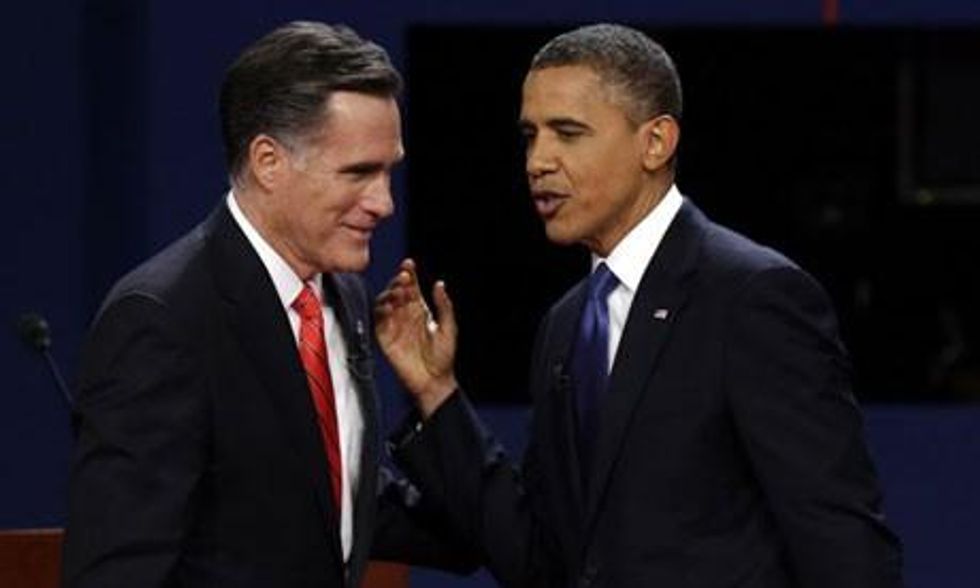Presidential campaigns aren't where you look for honest, serious discussion of economic policy. Usually, the candidates confine themselves to slogans; sometimes, as with George W Bush, we also get a moron. But in this election, something very different is going on. For the first time, we are explicitly seeing the effects of America's new political duopoly.
Both Obama and Romney are very intelligent men. And yet, both of them are completely avoiding, or being dishonest about, huge economic issues - even when their opponent is highly vulnerable to attack. Thus, we have the bizarre spectacle of a Republican ex-private equity banker attacking the Democrat on unemployment, while the Democrat argues gamely that if we just give him more time, everything will be fine - which we all know is not true. Both men say vaguely that they will "reform Washington", when neither means it.
Neither of them says a serious word about the causes of the financial crisis; the lack of prosecution of banks and bankers; sharply rising inequality in educational opportunity, income and wealth; energy policy and global warming; America's competitive lag in broadband infrastructure; the impact of industrialized food on healthcare costs; the last decade's budget deficits and the resultant national debt; or the large-scale, permanent elimination of millions of less-skilled jobs through both globalization and advances in robotics and artificial intelligence.
In a time of pervasive economic insecurity, with declining incomes and high unemployment, four years after a horrific financial crisis, how can all of these questions be successfully ignored by both candidates?
As it turns out, their behavior is entirely rational, though for disconcerting reasons. The answer lies in the combined effect of three related forces: America's deepening economic problems; the role now played by money in politics; and the emotions of a scared, increasingly cynical, economically insecure electorate.
Since the late 1970s, US politics has been increasingly shaped by the pressures generated by globalization, rising inequality and America's declining competitiveness. As average Americans felt increasing pressures and endured stagnant real wages, they initially responded by working longer hours and going into debt (personal, household debt). But then came politics.
Beginning with the Reagan-Carter contest in 1980, Republicans started to abandon traditional financial prudence in favor of an increasingly demagogic strategy of blaming government regulation, waste and welfare payments in order to justify tax cuts. Demonization of regulation served the additional purpose of justifying the deregulation of industries such as financial services and energy. Since the Republicans' tax cuts were never accompanied by spending cuts, they not only reduced voters' tax bills, but also stimulated the economy generally.
It was unsustainable, of course, but when the Democrats tried counter-arguments based on fiscal prudence and government services, they generally got slaughtered - as did Carter in 1980, and Mondale in 1984.
It worked again for George W Bush, although, of course, he lost the popular vote in 2000 and only became president thanks to an infamous supreme court decision. But it really did work in 2004, when he trounced Kerry despite the increasingly obvious disasters of the Iraqi occupation.
And so, starting with Clinton's reduction of capital gains taxes and financial deregulation, the Democrats started making deals with the devil. Clinton, to his credit, still tried to do some progressive things where he could, and the internet revolution allowed him to balance his budget. But the Democrats have, by now, been profoundly reshaped by the oceans of money that dominate US politics.
In 2008, Obama could afford to run as the reformer, and perhaps even needed to. But not so in 2012: Obama's economic positions - not just his actions, but even his public statements and promises - are the result of triangulating reality, public opinion and money. Obama still needs to get some votes from his base, so he must call for some burden-sharing by the rich. But he cannot be honest about the depth, or the sources, of America's structural economic problems, for two reasons.
First, he would be telling much of his blue-collar, minority, unionized and/or less-educated voter base that their skills are obsolete and they are economically doomed. Even in 2008, he might not have been able to get away with that; he certainly can't get away with it now. But second, Obama cannot be honest about the economic damage caused by a criminalized, out-of-control financial sector, nor about other major industries contributing to America's economic problems (energy, telecommunications, industrialized food, pharmaceuticals) - because he needs their money.
As a result, Obama seemingly makes himself unusually vulnerable on the economy. But he can afford to, because Romney cannot take full advantage of Obama's vulnerabilities. Romney, you see, depends even more heavily on the money and support of the financial sector, the wealthy, business and of anti-union, anti-immigrant forces. Romney's only appeal to average Americans is through "values" conservatism (religion, opposition to gay marriage, abortion, drugs, immigration, etc), vague complaints about government bureaucracy and, yet again, tax cuts.
And so Obama can avoid all the hard issues and yet retain the grudging support of his base simply by proposing modest tax increases on the wealthy, and by supporting the safety net (unemployment benefits, Medicare, social security) that Romney might cut.
Voila: an election in which there are a dozen elephants in the room, and neither candidate pays them any notice at all; an election that Obama can win because he's somewhat less bad, somewhat less utterly bankrupt, than the other guy.
Welcome to America's new and improved two-party system.




